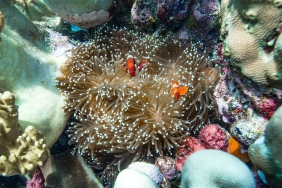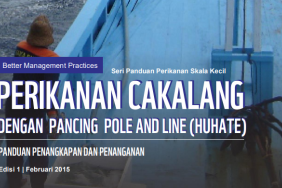RELEASING SEA TURTLE IN EASTERN KEI KECIL: FROM INFORMATION TO CONSERVATION ACTION
The coastal community of East Kei Kecil, Southeast Maluku together with the Maluku Natural Resources Conservation Center (BKSDA) Tual Resort released three sea turtles. The three turtles are two hawksbill turtles (Eretmochelys imbricata) and one green turtle (Chelonia mydas). The turtles were previously kept by residents at the Lornidik Cafe in Ohoi Disuk village, East Kei Kecil sub-district, Southeast Maluku.
Information of the turtle keeping was obtained from a citizen's report regarding the maintenance of protected species. The report was then followed up by BKSDA by checking the location directly (5/6). Apparently, the information received was true. From information to action, that is the follow-up with the release.
Yuventus Jaftoran (54 years old), the owner of the cafe, stated that he did not understand that sea turtles are protected animals. The middle-aged man who still relies on the sea as his main livelihood said he was very happy and supported the release efforts made by the Maluku BKSDA.
He admitted that the turtles he kept were not deliberately sought for consumption or sale, it was just that a week ago the turtles were caught in his fishing gear and then he moved them to fish cages. "The people in Southeast Maluku, in Kei, hopefully more people will realize what I feel, so that in the future it will not happen again. We all need to preserve our sea," said Yuventus as the turtles were brought in for release.
"We hope that Mr. Yuventus can also convey it to other basudara families so that they can follow what was made," said Justinus P. Yoppi Jamlean, Head of the Tual BKSDA Resort. "Our appreciation to Mr. Yuventus for this turtle release, which shows that he also supports the government's efforts to conserve one of the protected marine biota," he continued.
This is as mandated by Law Number 05 of 1990 concerning Conservation of Living Natural Resources and Ecosystems that anyone who deliberately commits an offense will be punished with imprisonment of up to 5 (five) years with a maximum fine of Rp 100,000,000 (one hundred million rupiah).
As before, the release was carried out by taking morphometric data on the turtles by measuring the length of the carapace arch or Curved Carapace Length (CCL) and the width of the carapace arch or Curved Carapace Width (CCW). The measurement results of each individual: hawksbill turtle (1) CCL 34 cm and CCW 30.5 cm, (2) CCL 36 cm and CCW 32 cm, while in green turtle (3) CCL 48 cm, CCW 47 cm, all turtles released are female turtles.
The turtles were then taken by Maluku BKSDA and released in the waters of Ohoiwa Island, on the west coast of Kei Kecil Island together with the Fisheries Service of Tenggata Maluku Regency, Class I Ambon Agricultural Quarantine Station Tual Working Area, RRI Tual and WWF Indonesia - Inner Banda Arc Subseascape. Ohoiwa Island was chosen as the release location because it is a marine conservation area in the Kei Islands.
This is the second release of protected turtle species after the confiscation of 4 hawksbill turtles at Forganza Cafe (21/1). If examined more deeply, there is a phenomenon of social pathology influenced by cultural factors in society. Turtles are still considered as animals that can be consumed for food, and can also be kept to attract attention.
People who already know do not fully understand, while those who understand still think that as long as the regulations are not socialized directly to the villages, they are treated with apathy. This is a serious concern and needs an intensive role in handling it. Social approach efforts that target community awareness to be systematically fostered are the first step before law enforcement is carried out to minimize social conflict.
Sea turtles play an important role in maintaining the balance of the marine ecosystem, namely as a contributor to water fertility and filling a key position in the food chain of the ocean ecosystem. Hopefully, more people will know and realize the importance of sea turtles for the sustainability of marine ecosystems so that sea turtle populations in nature can avoid the threat of extinction. A healthy marine ecosystem will improve the welfare of fishermen and promote marine tourism. Let's protect sea turtles, for the common good of current and future generations.





